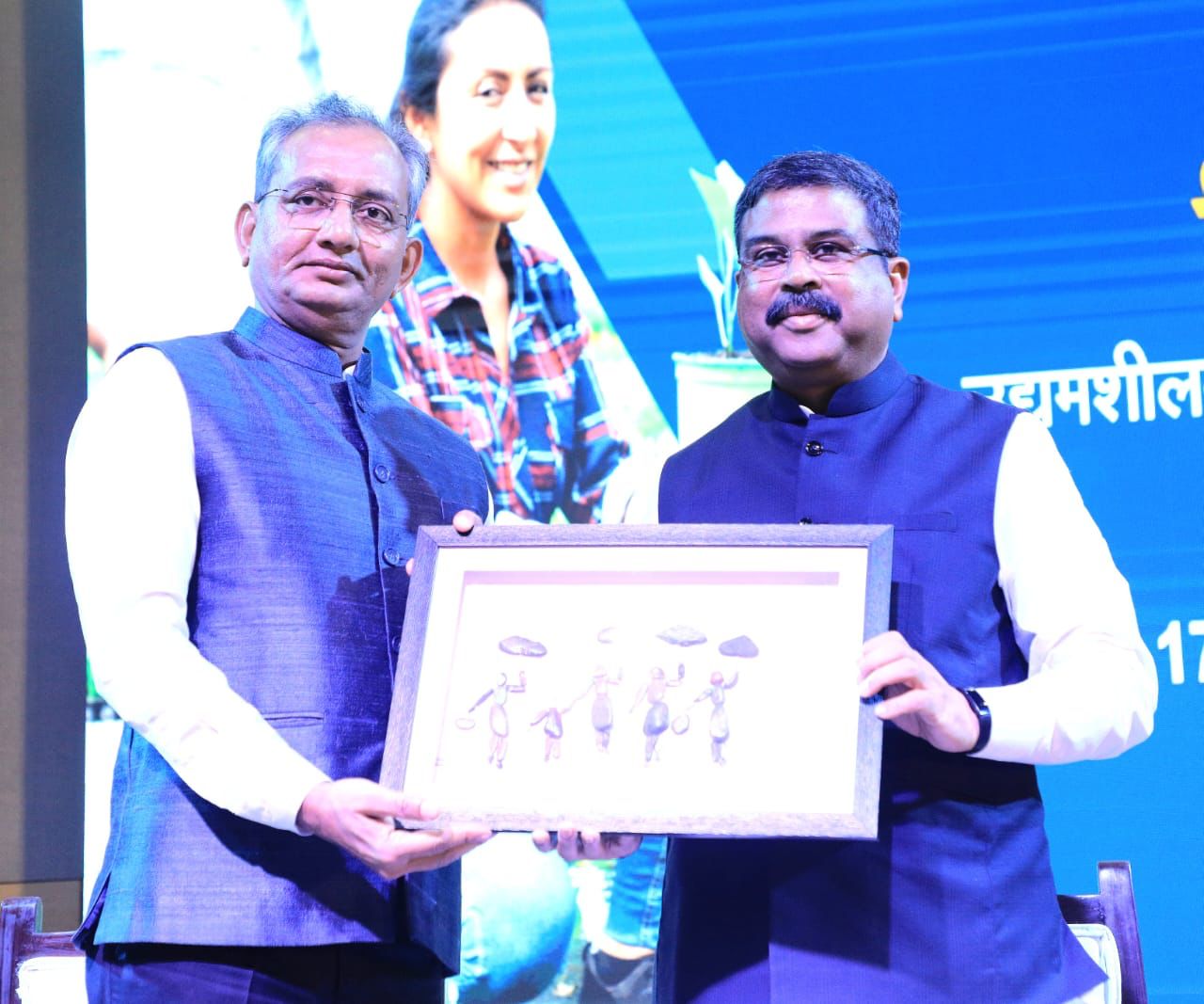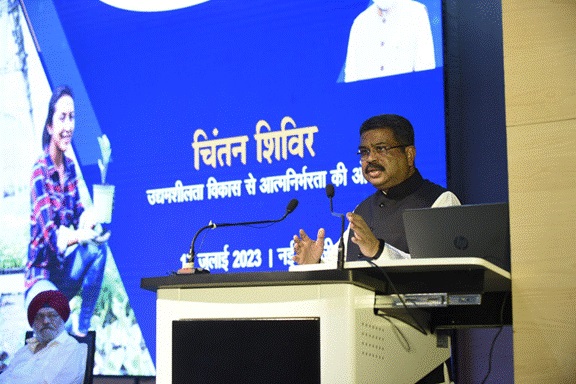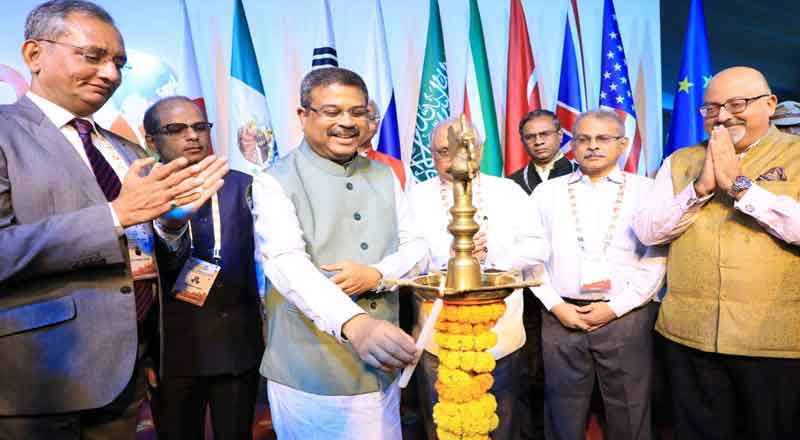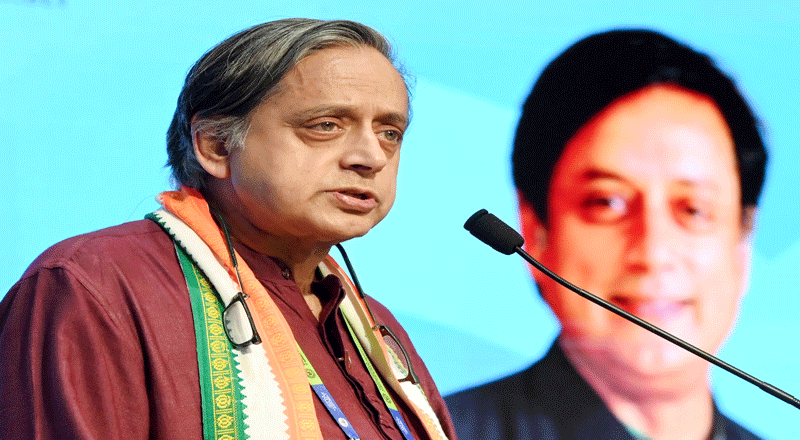Union Minister for Education & Skill development & Entrepreneurship Shri Dharmendra Pradhan addressed Chintan Shivir organized by Ministry of Skill Development & Entrepreneurship in New Delhi today.
Shri Rajeev Chandrasekhar, Minister of State, Ministry of Skill Development and Entrepreneurship, and Ministry of Electronics and IT; Secretary, MSDE Shri Atul Kumar Tiwari and senior officials of the Ministry attended the Shivir.
To foster the growth of entrepreneurship in India, the Ministry of Skill Development & Entrepreneurship (MSDE) organised “Chintan Shvir”, aimed at bringing together various stakeholders, including central ministries, State governments, organizations, institutions, financial institutions, and entrepreneurs, to collaborate and create a unified approach towards promoting entrepreneurship.

Speaking on the occasion, Shri Pradhan shared his thoughts on capitalising on skill development to spur entrepreneurship and how to reap the benefits of the new digital and creator economy.
Shri Pradhan further said that India is home to world’s third largest startup ecosystem. Young India’s innovation and creativity coupled with supportive government policies like the Digital India, Startup India are enabling our youth to become job creators. The Minister also shared his thoughts on how skill development, technology, digitisation, institutional lending, capacity development and branding can further give boost to entrepreneurship at the grassroots and create millions of nano entrepreneurs from the bottom-of-the-pyramid population.

Shri Rajeev Chandrasekhar, said that today, young Indians are heeding Prime Minister’s call to become job creators, not job seekers. They aim to propel their traditional family businesses or venture into entrepreneurship as part of their natural evolution. Entrepreneurship is now an opportunity for young Indians across new India, no longer an exception. However, it is crucial to acknowledge that entrepreneurship opportunities differ from state to state. Every individual possesses unique abilities and talents, necessitating the design of tailored entrepreneurship programs that harness their diverse potential, he added.
The event was divided into specific break-out sessions to address various aspects of entrepreneurship development, delve deeper into key focus areas, and propose actionable strategies. The sessions delved deeper into three thematic areas: strengthening the country’s entrepreneurial ecosystem, fostering financial, marketing, digital linkages and compliances for enterprises, and capacity building, mentoring and handholding.
The first break-out session, strengthening the entrepreneurial ecosystem in the country, focused on fostering a convergent entrepreneurial ecosystem for supporting the aspiring and existing entrepreneurs from rural and urban areas, including LWE districts, aspirational districts, vibrant villages, north-east region, border areas, etc., bring regulatory reforms and Policy Interventions, promoting and strengthening women entrepreneurship, and creating an enabling policy environment for entrepreneurship.
The second break-out session, Fostering Financial, Marketing, Digital Linkages and Compliances for Enterprises, focused on improving access to finance for small businesses, providing alternative funding models for startups and small businesses, bringing innovative financing mechanisms for entrepreneurs from marginalized communities, exploring market access opportunities, including domestic and international markets, government procurement, and e-commerce platforms, leveraging digital technologies and tools to enhance business operations, productivity, and customer engagement through digital marketing, e-commerce, social media, and online presence for enterprises, and streamlining compliance processes and reducing administrative burdens for small and medium enterprises.
The third break-out session, Capacity Building, Mentoring and Handholding, focused on bringing effective training programs for developing entrepreneurial skills and making entrepreneurship education application-oriented with different training techniques, bringing standardization and embedding of entrepreneurship in education, fostering institutional Network, mentoring and handholding Process, and leveraging emerging technologies (AI, blockchain, IoT) for entrepreneurial growth.
Post the breakout sessions, the groups presented their findings and insights, effectively summarizing the workshop. Each group highlighted key takeaways and proposed actionable strategies to foster entrepreneurship in India. Some of the key takeaways from the workshop included that there is a need to provide continued counselling & mentoring support to entrepreneurs with a convergent approach. They also need to have more access to credit, branding and marketing. Moreover, digital literacy and adoption should be promoted at a better level.





